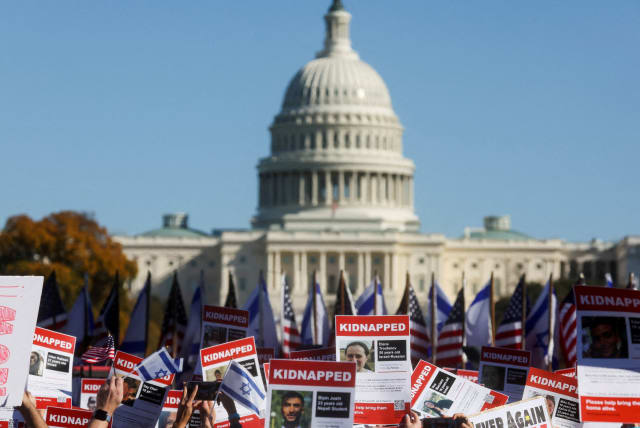JPPI survey: Support for Israel varies based on political and religious affiliations of US Jews

"2024 has seen a profound deterioration in the situation of Diaspora Jews, largely due to the war in Israel, significantly affecting the sense of security for Jews around the world."
According to a recent Jewish People Policy Institute (JPPI) survey, four out of five US Jews reported a decline in their sense of safety in the country, and a majority of Jewish liberals continue to support a two-state solution. Additionally, the survey exposed the current political trends among American Jews amid the ongoing war in Israel and the upcoming US presidential elections.
The survey, conducted by JPPI's Voice of the Jewish People Index, analyzed responses based on political and religious affiliations in American Judaism.
Perceptions of Security
In JPPI’s recent annual assessment, A Year of War, nearly one-third of Jewish parents in the US advised their children to conceal their Jewish identity on college campuses.
The assessment also noted that since October 7, 2023, there has been a significant increase in antisemitic activity and calls to boycott Israel. This has led Diaspora Jews to feel even more insecure.
Connection to Israel
JPPI also analyzed the overall connection US Jews have felt to Israel since the October 7 attack of last year.
JPPI reported that over the past year, Jewish conservatives felt almost as connected to Israel as they did at the beginning of the war, with a range of 76% to 85%. However, among Jewish liberals, the sense of connection has decreased. In a survey conducted in mid-September, 38% of those identifying as "strong liberals" said the war had made them feel more distant from Israel, an increase from 29% in July.
Support of Israel's actions
The JPPI study also revealed a decline in support for the IDF among "strong liberal" participants. The proportion of this group, who viewed Israel's actions as excessively aggressive, rose from 51% in January to 69% in August.
In the survey, participants were asked whether they agreed with the claim that Israel is committing "genocide" in Gaza. Among "strong liberals", belief in this claim increased slightly from 8% in June to 12% in August. However, the vast majority of participants in other groups rejected this view, with only a small number in agreement.
Two-State Solution
Further, the JPPI study reported a majority of participants who identified as liberal believed that the war must "end immediately." In contrast, 44% of centrists and 69% of conservatives disagreed.
Most liberals also supported a "two-state solution" as the resolution to the war. Most centrists and conservatives opposed this idea.
JPPI reported that this difference in opinion is also reflected when considering religious affiliation, with Reform and Conservative Jews generally supporting a two-state solution and Orthodox and ultra-Orthodox Jews primarily opposed.
Support for Israel and US Elections
The JPPI analysis showed that nearly a third, 29%, of the "strong liberal" group believes that "the US supports Israel too much", whereas a significant 96% of conservative Jews feel that the US does not provide enough support to Israel.
When asked about the upcoming US election, 87% of liberal voters mostly viewed Kamala Harris as "pro-Israel", while 91% of conservative Jews saw Donald Trump as pro-Israel.
The study also found that 92% of "strong liberals" and 80% of "leaning liberals" planned to vote for Harris, while 76% of conservative participants said they would vote for Trump.
Criticism of Israel's public messaging
The JPPI study examined how US Jews perceived Israel's wartime public messaging over the past year, revealing a drop in the number of participants who felt Israel effectively communicated its narrative compared to the start of the conflict.
Since May of this year, more than half of the survey participants across all groups, except for the "strong conservatives," believed that Israel is performing "poorly" or "somewhat poorly" in communicating its side of the story.
Similarly, the JPPI survey found that across religious denominations, the majority of respondents—except for the ultra-Orthodox—viewed Israel's public messaging as sub-par.
Optimism about Israel's future
According to JPPI, 53% of the panel of US Jews remain confident in Israel’s ability to defeat its enemies. Confidence was highest among conservatives and centrists, while fewer than half of liberals felt the same.
JPPI reported that optimism about Israel’s future increased along political and religious spectrums, with 59% of "strong conservatives" and 56% of ultra-Orthodox respondents feeling "very optimistic", compared to only 10%-15% among liberals and Reform Jews.
JPPI President Professor Yedidia Stern said, "As demonstrated by our extensive series of surveys and research, 2024 has seen a profound deterioration in the situation of Diaspora Jews, largely due to the war in Israel, which has significantly affected the sense of security for Jews around the world."
"The war has also triggered an unprecedented wave of antisemitism in many countries, unseen since the end of World War II. However, this crisis also presents an opportunity to encourage Jewish immigration to Israel."
"Our research shows that although the bond between American Jews—who represent the largest Jewish community in the Diaspora—and Israel remains strong, it cannot be taken for granted. Israeli policymakers must be attentive to the erosion of support for and identification with Israel, particularly in liberal Jewish circles. This erosion must be addressed through concrete actions in terms of national public messaging and Jewish identity enhancement measures," Stern concluded.
Jerusalem Post Store
`; document.getElementById("linkPremium").innerHTML = cont; var divWithLink = document.getElementById("premium-link"); if (divWithLink !== null && divWithLink !== 'undefined') { divWithLink.style.border = "solid 1px #cb0f3e"; divWithLink.style.textAlign = "center"; divWithLink.style.marginBottom = "15px"; divWithLink.style.marginTop = "15px"; divWithLink.style.width = "100%"; divWithLink.style.backgroundColor = "#122952"; divWithLink.style.color = "#ffffff"; divWithLink.style.lineHeight = "1.5"; } } (function (v, i) { });

